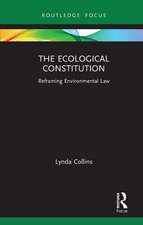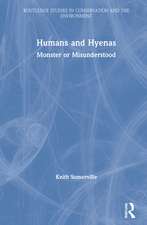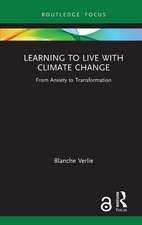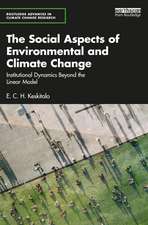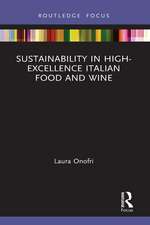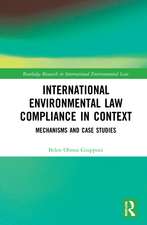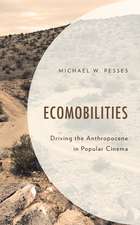Fate and Effects of Anticancer Drugs in the Environment
Editat de Ester Heath, Marina Isidori, Tina Kosjek, Metka Filipičen Limba Engleză Hardback – 2 ian 2020
| Toate formatele și edițiile | Preț | Express |
|---|---|---|
| Paperback (1) | 798.81 lei 38-44 zile | |
| Springer International Publishing – 26 aug 2021 | 798.81 lei 38-44 zile | |
| Hardback (1) | 815.13 lei 38-44 zile | |
| Springer International Publishing – 2 ian 2020 | 815.13 lei 38-44 zile |
Preț: 815.13 lei
Preț vechi: 1072.53 lei
-24% Nou
Puncte Express: 1223
Preț estimativ în valută:
155.99€ • 169.39$ • 131.03£
155.99€ • 169.39$ • 131.03£
Carte tipărită la comandă
Livrare economică 18-24 aprilie
Preluare comenzi: 021 569.72.76
Specificații
ISBN-13: 9783030210472
ISBN-10: 3030210472
Pagini: 474
Ilustrații: XVI, 469 p. 118 illus., 33 illus. in color.
Dimensiuni: 155 x 235 mm
Ediția:1st ed. 2020
Editura: Springer International Publishing
Colecția Springer
Locul publicării:Cham, Switzerland
ISBN-10: 3030210472
Pagini: 474
Ilustrații: XVI, 469 p. 118 illus., 33 illus. in color.
Dimensiuni: 155 x 235 mm
Ediția:1st ed. 2020
Editura: Springer International Publishing
Colecția Springer
Locul publicării:Cham, Switzerland
Cuprins
PART I - PRIORITISATION AND PREDICTED ENV. CONCENTRATIONS.- 1. Approaches for hazard assessment screening, ranking and prioritization of cytostatic compounds.- 2. Predicted Environmental Concentrations: a useful tool to evaluate the presence of cytostatics in surface waters.- PART 2 - ENVIRONMENT / WASTEWATER TREATMENT.- 3. Hospitals and pharmacies as sources of contamination by cytostatic pharmaceuticals: long term monitoring in the Czech Republic.- 4. Tamoxifen: Occurrence, fate, transformation products and non-conventional treatment technologies.- 5. Chlorination by-products of anticancer drugs.- 6. Cytostatic drug residues in wastewater treatment plants: Sources, Removal efficiencies and current Challenges.- 7. Degradation and elimination of anticancer drugs by water and wastewater treatment - toxicity and biodegradability before and after the treatment.- 8. Analytical Methodologies for the Determination of Cytostatic Compounds in Environmental Matrices.- 9. Cytostatic drugsremoval from water and wastewater: progress in development of advanced treatment methods.- 10. Occurrence of cytostatics in different water compartments.- 11. Photodegradation of cytostatic drugs in low-pressure UV photoreactor through direct and indirect pathways.- 12. Analysis, Occurrence and Fate of Cyclophosphamide and Ifosfamide in Aqueous Environment.- PART 3 - ENVIRONMENT / WASTEWATER TREATMENT and EFFECTS.- 13. Fate and effects of cytostatic pharmaceuticals in the marine environment.- 14. 5-fluorouracil and its prodrug Capecitabine: Occurence, Fate and Effects in the Environment.- PART 4 - TOXICITY (EFFECTS).- 15. Toxicity of anticancer drug residues in organisms of the freshwater aquatic chain.- 16. Genotoxicity of the residues anticancer drugs: a hazard for aquatic environment.- 17. Toxicity of antineoplastic drug mixtures.- 18. Enviromental metabolomics: a powerful tool to investigate biochemical responses to drugs in non-target organisms.
Notă biografică
Ester Heath, Jožef Stefan Institute, Ljubljana, Slovenia
Textul de pe ultima copertă
The book provides current knowledge and research on the presence and effects of anticancer drug residues in the aqueous environment and covers all relevant aspects of the presence of these residues in wastewaters and natural aquatic systems, where numerous analogies between their pharmacokinetics and pharmacodynamics in humans and their effects in the environment can be drawn. This book comprises of 18 chapters and represents the combined work of leading scientists from different research institutions from across the globe. We present the state of the art in the field of anticancer drug residues in the aquatic environment while being cognizant of the many challenges that remain.
Caracteristici
Provides reader insights into the presence of anticancer drug residues in wastewaters and natural aquatic systems Broadens the understanding of effects of anticancer drug residues in the aquatic environment Summarizes the latest studies on presence and effects of these compounds in the environment

